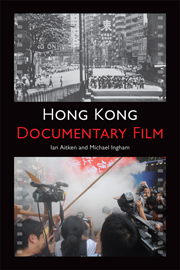Book contents
- Frontmatter
- Contents
- Introduction
- 1 Hong Kong, Britain, China: The Documentary Film, 1896–1941, A Page of History (1941) and The Battle of Shanghai (1937)
- 2 Hong Kong, Britain, China: The Documentary Film, 1947–69, the ‘Picturesque’ Committed Film and Water Comes over the Hills from the East (1965)
- 3 Colonial Film: The Development of Official Film–making in Hong Kong, 1945–73, the Hong Kong Film Unit (1959–73) and This is Hong Kong (1961)
- 4 Public-service Broadcasting in an Authoritarian Setting: The Case of Radio Television Hong Kong and the Development of Television Documentary Film in Hong Kong
- 5 The Documentary Films of Radio Television Hong Kong (RTHK) and The Hong Kong Case (1989)
- 6 Aesthetics and Radicalism: An Overview of Independent Documentary Film in Hong Kong, 1973–2013
- 7 A Critical Analysis of Significant Independent Documentary Films of the Past Three Decades
- Conclusions: The Future of Independent Documentary Film in Hong Kong, China and the Region
- Bibliography
- Index
2 - Hong Kong, Britain, China: The Documentary Film, 1947–69, the ‘Picturesque’ Committed Film and Water Comes over the Hills from the East (1965)
Published online by Cambridge University Press: 05 September 2014
- Frontmatter
- Contents
- Introduction
- 1 Hong Kong, Britain, China: The Documentary Film, 1896–1941, A Page of History (1941) and The Battle of Shanghai (1937)
- 2 Hong Kong, Britain, China: The Documentary Film, 1947–69, the ‘Picturesque’ Committed Film and Water Comes over the Hills from the East (1965)
- 3 Colonial Film: The Development of Official Film–making in Hong Kong, 1945–73, the Hong Kong Film Unit (1959–73) and This is Hong Kong (1961)
- 4 Public-service Broadcasting in an Authoritarian Setting: The Case of Radio Television Hong Kong and the Development of Television Documentary Film in Hong Kong
- 5 The Documentary Films of Radio Television Hong Kong (RTHK) and The Hong Kong Case (1989)
- 6 Aesthetics and Radicalism: An Overview of Independent Documentary Film in Hong Kong, 1973–2013
- 7 A Critical Analysis of Significant Independent Documentary Films of the Past Three Decades
- Conclusions: The Future of Independent Documentary Film in Hong Kong, China and the Region
- Bibliography
- Index
Summary
These guys who advocate for Hong Kong independence are sheer morons. Deprived of support from the mainland, Hong Kong will be a dead city. Where do they think the water comes from?
By the time of the outbreak of the Second World War in September 1939 the British Government had already come to the conclusion that Hong Kong could not be defended against expected attack by Japan. The most that could be hoped for, given the then improved relationship with China, one that is also signalled in The Battle of Shanghai, was that, if such an attack were to occur, China might help to delay the inevitable collapse of the colony by providing temporary military support. The object here was not, therefore, to save Hong Kong at all but to make the eventual fall of the colony appear less precipitous and chastening. To this end, in the summer of 1941 the British and Chinese governments reached an agreement whereby Chinese forces would engage any Japanese militias attacking Hong Kong. On 7 December 1941 Japanese aircraft attacked the American air base at Pearl Harbour, bringing the United States into the Second World War. Four hours after that assault began Japanese bombers struck Hong Kong and Japanese ground troops also began an advance on the territory from the southern Guangdong area. Under the terms of the agreement reached with Britain Chiang Kai-shek then ordered Chinese forces south to engage the Japanese in and around Guangzhou in order to open up a new front, and slow down the assault on the colony. However, the speed of the Japanese advance was such that Hong Kong fell before the Chinese army ever reached Guangzhou.
- Type
- Chapter
- Information
- Hong Kong Documentary Film , pp. 46 - 70Publisher: Edinburgh University PressPrint publication year: 2014



